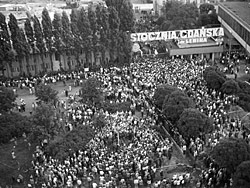
Unit 6: Modern World History
Lesson A: 20th Century Global Politics - The Cold War
Activity 5: Labor's Opportunity
The eventual fall of communism in Europe was rooted in the policies of the Soviet Union. Similar policies were used to rule other countries in Eastern Europe.
Directions: In order to get a better idea of the negative impact of these policies on Europeans, read the scenario below and answer the questions that follow.
Written Activity - Notebook
Imagine you are a poor factory worker living in a communist country. The government controls all wealth in the country, and dictates which services and products you can buy. Although the system is supposed to maintain equal wealth, you know most people are poor while the corrupt government gives most money to the elite and maintains a large military force. You also know that people in other democratic countries have the ability to purchase new technology, have more access to information and opportunity, and can vote or speak out against political leaders. Today, you hear that a non-violent labor strike will take place. If you join it, you could help pressure the government to change its restrictions about freedoms and the economy. However, you also know that the government could use violence to end the strike, and you could be injured or killed in the demonstration, or be sent to jail.
In your notebook, respond to the following questions:
- What are the potential costs of joining the strike?
- What are the potential benefits of joining the strike?
- Would you join the strike? Explain your response.
During the late Cold War period of the 1980s, many people in communist countries began to fight back against governments that denied democratic freedoms. Doing so meant risking violent reaction from the government that could include harassment, imprisonment, physical injury, or even death. Many individuals had to consider the same questions you answered above if they wanted to change their daily life. In addition to labor strikes, political parties were formed, government protests organized, and civil demonstrations were used to voice opposition to communist systems. Individuals and groups led the charge against the repressive governments.
The Soviet Union was the most powerful communist country of the world. As citizens of satellite countries in Eastern Europe increasingly protested communist governments, Soviet leaders were soon influenced by the general opposition. In the following activity, learn about some important leaders in the anti-communist movement of the 1980s.
Page Notes:
[1] Source: This image at http://en.wikipedia.org/wiki/File:Strike_Gdansk_1980.jpg is in the public domain.



